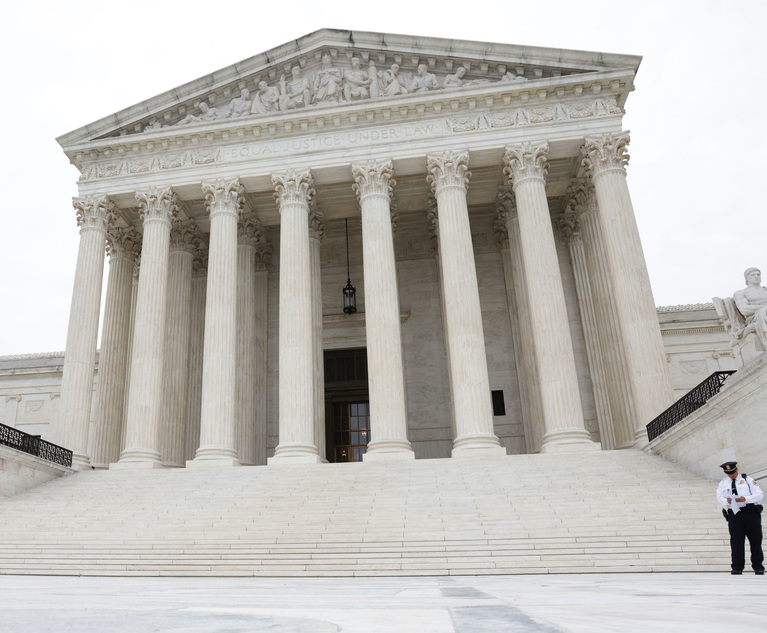 U.S. Supreme Court building in Washington, D.C. Sept. 30, 2022. Photo: Diego M. Radzinschi/ALM
U.S. Supreme Court building in Washington, D.C. Sept. 30, 2022. Photo: Diego M. Radzinschi/ALM State Secrets Privilege: A Challenge in International Litigation
The state secrets privilege has deep roots in American jurisprudence. Rudimentary references to it appear in early 19th-century jurisprudence.
May 02, 2023 at 08:01 AM
4 minute read
CommentaryA recent decision from the U.S. Court of Appeals for the First Circuit in Sakab Saudi Holding Co. v. Aljabri, 58 F.4th 585 (2023) reaffirms the force of the state secrets privilege in international civil litigation. While a doctrine with obscure roots, it promises to be increasingly important as more international cases have national security implications.
 Peter B. "Bo" Rutledge, left, dean of the University of Georgia School of Law, and Alexandra Lampe, right, LLM student from Germany at the University of Georgia School of Law. Courtesy photos
Peter B. "Bo" Rutledge, left, dean of the University of Georgia School of Law, and Alexandra Lampe, right, LLM student from Germany at the University of Georgia School of Law. Courtesy photos The state secrets privilege has deep roots in American jurisprudence. Rudimentary references to it appear in early 19th-century jurisprudence. In brief, the privilege allows the government to withhold information from the public and courts if its disclosure would harm national security. Successful invocation of the privilege has resulted in relief ranging from evidentiary rulings (like in United States v. Reynolds, 345 U.S. 1 (1953)) to outright dismissal of the case (as in Totten v. United States, 92 U.S. 105 (1875)).
This content has been archived. It is available through our partners, LexisNexis® and Bloomberg Law.
To view this content, please continue to their sites.
Not a Lexis Subscriber?
Subscribe Now
Not a Bloomberg Law Subscriber?
Subscribe Now
NOT FOR REPRINT
© 2025 ALM Global, LLC, All Rights Reserved. Request academic re-use from www.copyright.com. All other uses, submit a request to [email protected]. For more information visit Asset & Logo Licensing.
You Might Like
View All
CFPB Proposes Rule to Regulate Data Brokers Selling Sensitive Information
5 minute read

Trending Stories
Who Got The Work
J. Brugh Lower of Gibbons has entered an appearance for industrial equipment supplier Devco Corporation in a pending trademark infringement lawsuit. The suit, accusing the defendant of selling knock-off Graco products, was filed Dec. 18 in New Jersey District Court by Rivkin Radler on behalf of Graco Inc. and Graco Minnesota. The case, assigned to U.S. District Judge Zahid N. Quraishi, is 3:24-cv-11294, Graco Inc. et al v. Devco Corporation.
Who Got The Work
Rebecca Maller-Stein and Kent A. Yalowitz of Arnold & Porter Kaye Scholer have entered their appearances for Hanaco Venture Capital and its executives, Lior Prosor and David Frankel, in a pending securities lawsuit. The action, filed on Dec. 24 in New York Southern District Court by Zell, Aron & Co. on behalf of Goldeneye Advisors, accuses the defendants of negligently and fraudulently managing the plaintiff's $1 million investment. The case, assigned to U.S. District Judge Vernon S. Broderick, is 1:24-cv-09918, Goldeneye Advisors, LLC v. Hanaco Venture Capital, Ltd. et al.
Who Got The Work
Attorneys from A&O Shearman has stepped in as defense counsel for Toronto-Dominion Bank and other defendants in a pending securities class action. The suit, filed Dec. 11 in New York Southern District Court by Bleichmar Fonti & Auld, accuses the defendants of concealing the bank's 'pervasive' deficiencies in regards to its compliance with the Bank Secrecy Act and the quality of its anti-money laundering controls. The case, assigned to U.S. District Judge Arun Subramanian, is 1:24-cv-09445, Gonzalez v. The Toronto-Dominion Bank et al.
Who Got The Work
Crown Castle International, a Pennsylvania company providing shared communications infrastructure, has turned to Luke D. Wolf of Gordon Rees Scully Mansukhani to fend off a pending breach-of-contract lawsuit. The court action, filed Nov. 25 in Michigan Eastern District Court by Hooper Hathaway PC on behalf of The Town Residences LLC, accuses Crown Castle of failing to transfer approximately $30,000 in utility payments from T-Mobile in breach of a roof-top lease and assignment agreement. The case, assigned to U.S. District Judge Susan K. Declercq, is 2:24-cv-13131, The Town Residences LLC v. T-Mobile US, Inc. et al.
Who Got The Work
Wilfred P. Coronato and Daniel M. Schwartz of McCarter & English have stepped in as defense counsel to Electrolux Home Products Inc. in a pending product liability lawsuit. The court action, filed Nov. 26 in New York Eastern District Court by Poulos Lopiccolo PC and Nagel Rice LLP on behalf of David Stern, alleges that the defendant's refrigerators’ drawers and shelving repeatedly break and fall apart within months after purchase. The case, assigned to U.S. District Judge Joan M. Azrack, is 2:24-cv-08204, Stern v. Electrolux Home Products, Inc.
Featured Firms
Law Offices of Gary Martin Hays & Associates, P.C.
(470) 294-1674
Law Offices of Mark E. Salomone
(857) 444-6468
Smith & Hassler
(713) 739-1250







